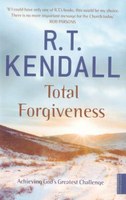Total Forgiveness
 Gillian Pegler | March 2014 - Highfields Book of the Month
Gillian Pegler | March 2014 - Highfields Book of the Month
By RT Kendall - (2010) London : Hodder & Stoughton Ltd
I read this book as background reading for a course I was writing. But it isn't a book to be read purely for information. Through this book, God challenged me about people that I hadn't forgiven, people I'd forgotten about, but came back to mind. So you've been warned! Prepare to be challenged...
Total Forgiveness isn't just the title of the book, it's the whole concept that Kendall is seeking to communicate. Total Forgiveness is forgiveness that holds nothing back, holds no grudges, doesn't bring that thing up again, and basically, is a bit of a risk. This is God's pattern of forgiveness, and he wants us to follow it in our lives and our dealings with people.
Kendall's catchphrase about forgiveness is 'letting them off the hook' - when we forgive someone, we let them off the hook, meaning that we stop trying to punish them (subconsciously or deliberately) for what they did. And we let go of the anger that we have been holding onto, the grudges and the bitterness. Often, we are the ones who get hurt the most when we don't forgive someone, and often we are the ones who benefit most from the act of forgiving.
But Total Forgiveness is more than letting them off the hook: it can mean knowing that no-one else knows that thing happened, so no-one else is ever going to give you the satisfaction of agreeing with you that it was an awful thing for that person to do to you, and the other person will effectively get away with it! (Obviously, where a crime has been committed then Total Forgiveness does not mean we don't involve the police. Involving the police is the right thing to do. Refusing to forgive is not). He uses God's forgiveness for us as the gold standard example of how we should forgive others - 'I therefore ask, how has the Lord forgiven me? Answer: my sins, which are many , will never be held against me and nobody will know what I have done.' (2001, p17)
Total Forgiveness, says Kendall, is being aware of what someone has done and still forgiving them, a choice to keep no records of wrong, refusing to punish, not telling what they did, being merciful and gracious, and bitterness is absent. As a result, we don't blab about what happened, we don't give the other person cause to be afraid of what we might disclose, we want them to forgive themselves, we want them to be able to save face and we pray for them to be blessed. Total Forgiveness may need to be a daily thing, a life commitment, as the pain of the event may sneak back and re-ignite the fire of bitterness, anger and hate. (Satan doesn't like Christians going around totally forgiving people).
He also explains clearly what Total Forgiveness is not - it is not approval of what they did, excusing what they did, justifying what they did, pardoning what they did, denying what they did, blindness to what happened, forgetting what happened, refusing to take the wrong seriously or pretending we are not hurt. Neither is it reconciliation, although it can lead to this.
There's a lot to think about here. It's a great book, that really helped me write the course, but more importantly, really changed me. Read it! (And when you're done, move on to 'How to Forgive Ourselves - Totally'!)
Document Actions

